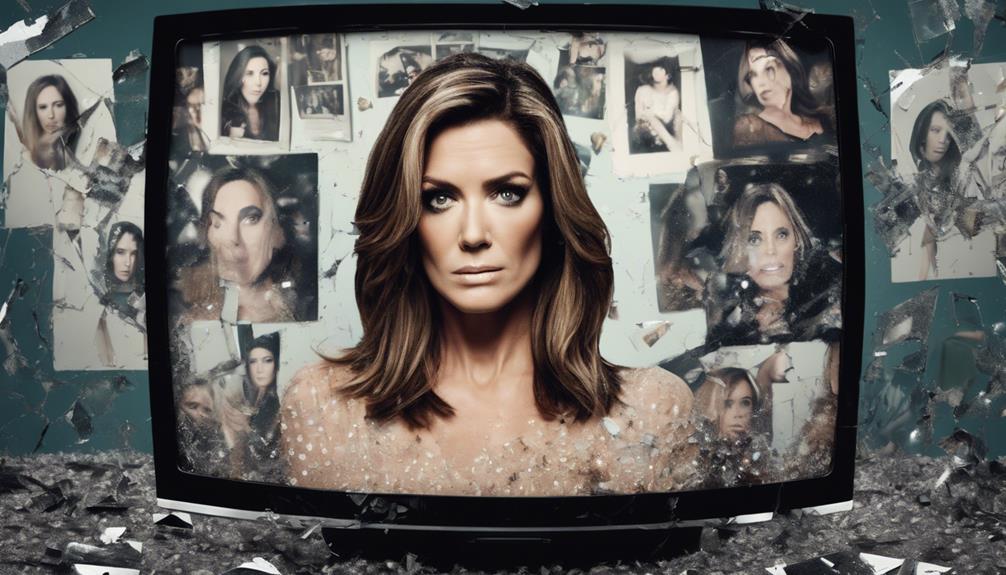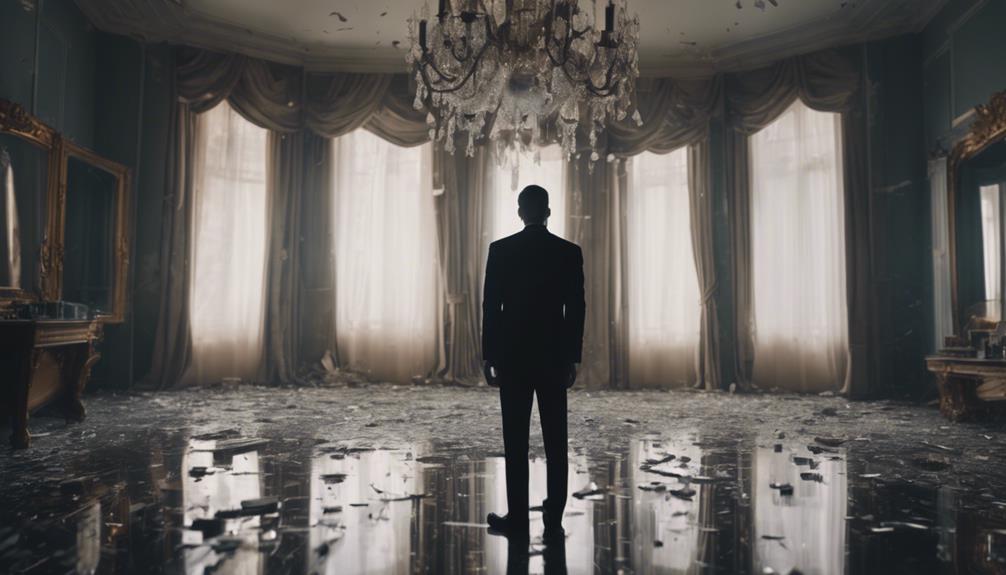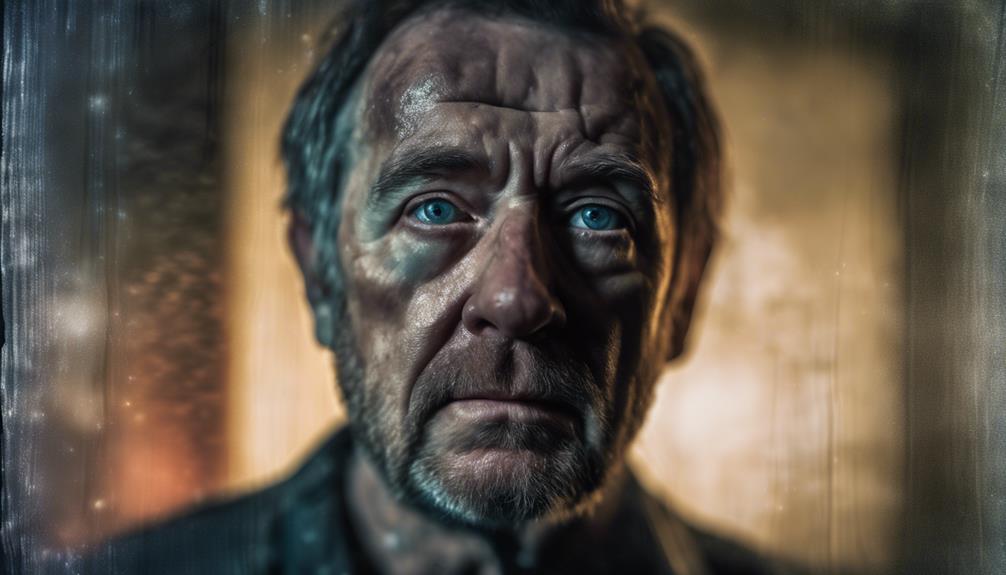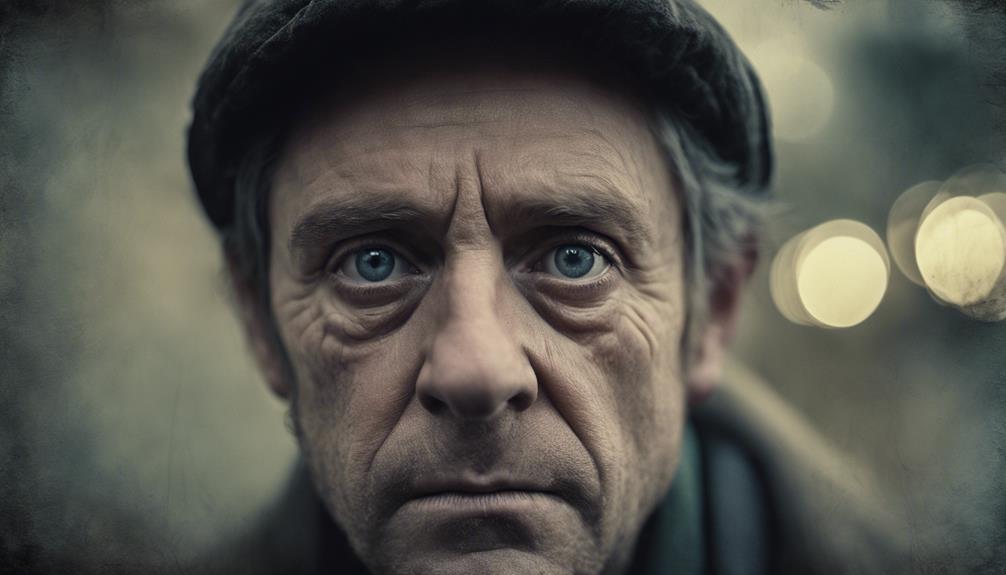Russell Armstrong's tragic journey on The Real Housewives of Beverly Hills exposed the dark underbelly of reality TV, where personal struggles are exploited for entertainment value. Armstrong's experience was marked by financial woes, public shame, and intense scrutiny, which contributed to his deeper depression. His tragic end, a suicide in 2011, serves as a wake-up call for the industry to reexamine its priorities and values. The psychological toll of reality TV, including the pursuit of outrageous behavior, takes a devastating impact on mental health. As the industry grapples with ethical considerations, a closer look at Armstrong's story reveals the hidden demons and a call for stricter guidelines to protect mental health. More is revealed about the harsh reality behind the glamour of reality TV.
Key Takeaways
• Russell Armstrong's tragic journey on The Real Housewives of Beverly Hills exposed the dark underbelly of reality TV, highlighting exploitation for entertainment value.
• Armstrong's struggles with financial woes, public shame, and marital issues contributed to his deepening depression and eventual suicide.
• The reality TV industry's pursuit of outrageous behavior and manufactured drama takes a toll on mental health, ignoring the well-being of its stars.
• The tragic end of Russell Armstrong's life serves as a wake-up call for the industry to re-examine its priorities and implement stricter guidelines to protect mental health.
• The Armstrong tragedy reveals the hidden demons of reality TV, emphasizing the need for ethical considerations and a re-evaluation of the industry's values.
Reality TV's Dark Underbelly
Behind the glamour of reality TV lies a darker reality, where the lines between entertainment and exploitation blur, as exemplified by Russell Armstrong's tragic experience on The Real Housewives of Beverly Hills. Armstrong's struggles with depression, financial issues, and personal turmoil highlighted the darker side of reality television. The show documented Armstrong's downward spiral, raising concerns about the ethical implications of airing personal struggles for entertainment. His tragic story serves as a stark reminder of the potential consequences of reality TV's insatiable appetite for drama and conflict.
The Real Housewives of Beverly Hills, in particular, has been criticized for its portrayal of Armstrong's vulnerabilities, sparking debates about the ethical responsibilities of reality TV producers. The show's decision to air Armstrong's personal struggles has sparked questions about the boundaries between entertainment and exploitation. As reality TV continues to captivate audiences, Armstrong's tragic experience serves as a cautionary tale, highlighting the need for producers to prioritize ethical considerations alongside entertainment value.
Exploitation for Entertainment Value

Russell Armstrong's tragic story has sparked a heated debate about the exploitation of personal struggles for entertainment value, with many questioning the morality of reality TV's focus on showcasing participants' conflicts and weaknesses for the sake of higher ratings. The reality TV industry's emphasis on dramatic storylines and sensationalized portrayals has led to concerns about the exploitation of participants' personal struggles. Armstrong's financial problems and negative portrayal on the show highlighted the ethical considerations of reality TV programming, raising questions about the psychological toll of being in the spotlight.
Participants often sign waivers exposing their personal lives to cameras, which can lead to a blurring of the lines between reality and entertainment. The tragic outcome of Armstrong's story has sparked discussions on the balance between entertainment value and the well-being of reality TV stars, prompting a re-examination of the industry's priorities and values.
Armstrong's Descent Into Depression

As Russell Armstrong's life began to unravel, his mental health started to deteriorate rapidly. The cumulative effect of his legal troubles, financial woes, and marital issues took a devastating toll on his psyche, pushing him further into the darkness of depression.
His struggles to cope with the pressure of reality TV and the facade of a perfect life on 'Real Housewives of Beverly Hills' only exacerbated his downward spiral.
Dark Days Ahead
Legal troubles, including felony tax evasion and battery charges, marked the beginning of Armstrong's downward spiral into depression. These legal issues, combined with marital problems and financial struggles, created a perfect storm of stress and anxiety in Armstrong's life.
The constant barrage of negative attention, including allegations of abuse and bankruptcy filings, took a toll on his mental health. The reality TV show, Real Housewives, may have also contributed to his declining mental state, as the constant scrutiny and negative portrayals can be damaging to one's self-esteem.
As Armstrong's depression deepened, his loved ones grew increasingly concerned about his well-being. Tragically, on August 15, 2011, Armstrong's struggles came to a devastating end with his suicide. This heartbreaking event highlighted the severity of his depression and the importance of addressing mental health issues.
Armstrong's story serves as a poignant reminder of the dangers of unchecked depression and the need for greater support systems for those struggling with mental health challenges.
Struggling to Cope
Financial woes, including a staggering $12 million in debts, weighed heavily on Armstrong's shoulders, exacerbating his downward spiral into depression. Russell Armstrong's struggles to cope with his financial troubles were further complicated by legal issues, including a felony tax evasion charge in 1995 and spousal battery allegations in 1997 and 2003. His marital problems, including two divorces, added to his emotional turmoil.
| Year | Event | Impact on Mental Health |
|---|---|---|
| 1995 | Charged with felony tax evasion | Increased stress and anxiety |
| 1997 | Allegations of spousal battery | Emotional turmoil and feelings of guilt |
| 2003 | Allegations of spousal battery (again) | Escalating feelings of shame and hopelessness |
| 2004 | Divorce from Barbara | Loss and feelings of failure |
| 2011 | Divorce from Taylor | Overwhelming sense of despair |
The pressure to maintain a lavish lifestyle on reality TV, as seen on The Real Housewives of Beverly Hills, took a toll on Armstrong's mental health. The constant scrutiny and pressure to project a perfect image only added to his struggles with depression.
Financial Woes and Public Shame

By 2005, Russell Armstrong's lavish spending habits and poor investments had accumulated a staggering $12 million in debts, forcing him to file for bankruptcy. This financial turmoil marked the beginning of his downward spiral into depression.
The reality TV show, which portrayed him as wealthy and successful, only added to his public shame, as his actual financial struggles were far from the luxurious lifestyle depicted on screen.
The Armstrongs were even named in lawsuits for misappropriation of funds, further exacerbating their financial woes and negative public image. The contrast between his on-screen persona and real-life financial troubles led to intense scrutiny, which without a doubt contributed to Russell's deepening depression.
As his financial troubles worsened, so did his mental health, ultimately culminating in his tragic suicide in 2011. Russell's story serves as a stark reminder of the devastating consequences of unchecked financial troubles and the crushing weight of public shame.
The Psychological Toll of Reality TV

As reality TV shows like The Real Housewives amplify the private lives of their participants, they inadvertently create a perfect storm of psychological stress. The constant scrutiny and public judgment can take a devastating toll on mental health. The pressure to present a perfect image, combined with the constant scrutiny of their personal lives, can lead to feelings of anxiety, depression, and low self-esteem.
Russell Armstrong, the late husband of Taylor Armstrong, was a stark example of the devastating effects of reality TV on mental health. His struggles with depression, which ultimately led to his tragic suicide, were well-documented on the show. The pursuit of outrageous behavior to attract viewers can have a detrimental impact on the mental health and well-being of reality TV participants.
The constant pressure to create drama and controversy can lead to a culture of competition, where participants are pitted against each other, further exacerbating the psychological strain. The Real Housewives, in particular, has been criticized for its portrayal of catty conflicts and manufactured drama, which can have long-lasting effects on the mental health of its participants.
Industry Ethical Considerations

Reality TV producers and networks face intense scrutiny for their role in exploiting participants' personal struggles and vulnerabilities, as exemplified by Russell Armstrong's tragic story. The reality TV industry has long been criticized for its lack of ethical considerations, particularly when it comes to protecting the well-being of its participants.
Russell Armstrong's suicide sparked debates on the psychological toll of reality TV shows and the responsibility of networks in showcasing sensitive content. Participants often sign waivers allowing cameras to capture intimate details, raising ethical concerns about exploitation. The minimal regulation in reality TV programming highlights the need for ethical considerations when documenting sensitive issues.
Families and advocates criticize networks for potential contributions to tragedies by showcasing personal conflicts for entertainment. The industry's lack of ethical considerations has sparked calls for reform, with many advocating for stricter guidelines to protect participants' mental health and well-being.
A Tragic Wake-Up Call

Russell Armstrong's tragic suicide in 2011 served as a stark reminder of the dark reality that often lies beneath the glamour of reality TV. The incident exposed the hidden demons that many reality TV participants face, including the pressure to maintain a perfect image and the exploitation of personal struggles for entertainment value.
As the reality TV industry grappled with the aftermath of Armstrong's death, it became clear that a deeper exploration of the psychological toll of reality TV exposure was long overdue.
Dark Reality Revealed
Behind the glamorous facade of reality TV, a dark reality was hiding in plain sight, waiting to be exposed by the tragic event that would change everything. Russell Armstrong's suicide on August 15, 2011, shed light on the dark reality behind the glamorous facade of reality TV. The absence of a suicide note left many questioning the factors that led to Russell's tragic decision. Despite the troubled relationship documented on TV, Taylor Armstrong allowed the airing of the events surrounding Russell's suicide.
The suicide took place in Los Angeles, California, impacting not only the Armstrong family but also viewers of The Real Housewives of Beverly Hills.
Russell Armstrong's death served as a wake-up call regarding the psychological toll of being in the spotlight on reality television.
The reality show, which once showcased the couple's seemingly perfect life, now served as a stark reminder of the devastating consequences of mental health struggles.
Hidden Demons Exposed
As the news of Russell Armstrong's suicide sent shockwaves through the reality TV community, it became clear that his struggles with depression had been hiding in plain sight, masked by the glamour and glitz of The Real Housewives of Beverly Hills.
His tragic death on August 15, 2011, served as a wake-up call to the impact of mental health issues in the reality TV world. The lack of a suicide note added to the mystery surrounding Russell's internal battles, leaving many questions unanswered.
His suicide prompted discussions on the psychological toll of being in the public eye, highlighting the importance of addressing mental health concerns in the context of reality TV exposure. Russell's story exposed the darker side of reality TV, where the pursuit of fame and fortune can come at a devastating cost.
His struggles with depression and eventual suicide have sparked a much-needed conversation about the pressures of living in the public eye and the importance of seeking help for mental health issues.
Frequently Asked Questions
Did Russell Break Taylor's Jaw?
Russell Armstrong was accused of breaking Taylor Armstrong's jaw during an alleged incident of domestic violence. Taylor claimed Russell physically abused her, leading to her hospitalization for a broken jaw.
However, Russell denied the allegations, maintaining his innocence. The incident became a focal point of their tumultuous relationship, with conflicting accounts of what actually happened.
What Happened Between Russell and Taylor Armstrong?
Taylor Armstrong's tumultuous marriage to Russell Armstrong was marked by allegations of misappropriation of funds and personal struggles.
The couple's marriage, which began in 2005, ended with Taylor filing for divorce in 2011, citing the best interests of their family.
As their relationship crumbled, Russell's financial woes and depression worsened, ultimately leading to his tragic suicide in 2011.
Who Is Taylor Armstrong's Daughter?
Taylor Armstrong's daughter is Kennedy Armstrong, born in 2006. At the time of her father Russell Armstrong's suicide, Kennedy was only 5 years old.
Fortunately, she wasn't present when her father's body was found. Taylor has made a conscious effort to maintain positive memories of Russell for Kennedy's sake, guided by her psychiatrist's advice on how to discuss her father's death with her.
Conclusion
As the curtain falls on Russell Armstrong's tragic tale, a stark reality emerges: the Real Housewives franchise's pursuit of ratings and entertainment value came at the cost of a man's life. Like a Greek tragedy, Armstrong's descent into depression was a slow-motion train wreck, fueled by the very same forces that propelled him to fame.
In the end, it wasn't the spotlight that killed him, but the darkness that lurked in its shadows – a cautionary tale of the devastating consequences of reality TV's exploitation.










